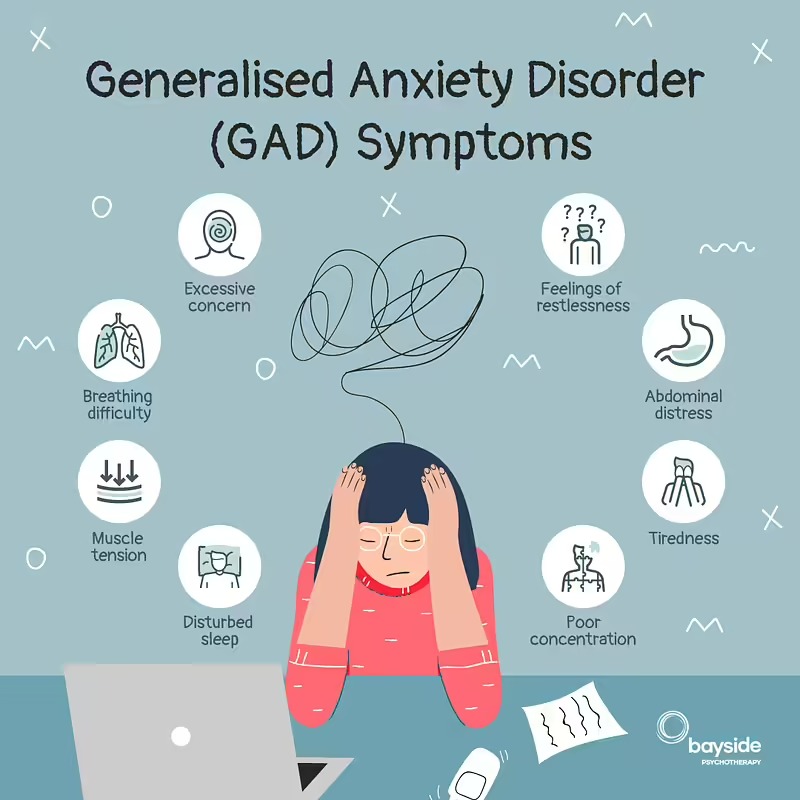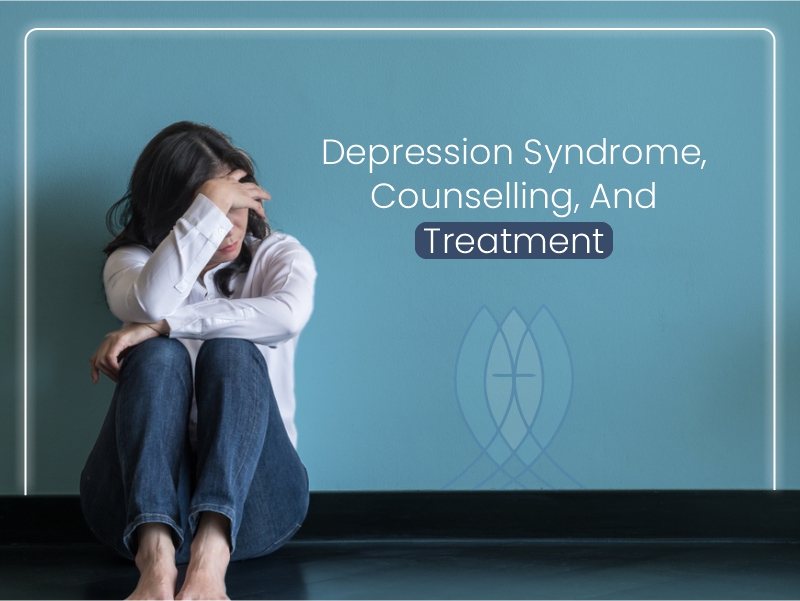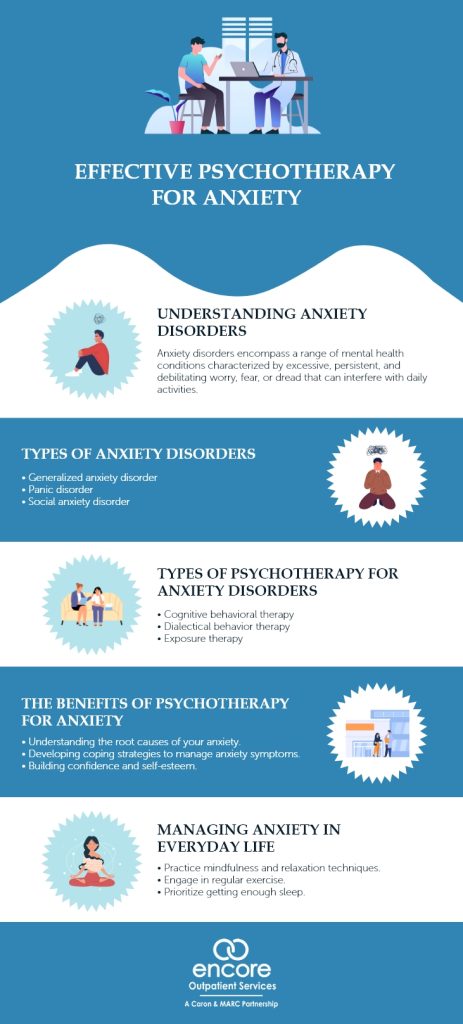Checking Out Various Strategies in Counselling for Stress And Anxiety Disorder for Long Lasting Adjustment
When dealing with anxiousness problems, it's vital to check out a range of counseling techniques. Each method uses special understandings and tools to help you manage your signs successfully. You could find that combining methods can produce the very best outcomes. Comprehending the nuances of these strategies is key to fostering lasting adjustment. What happens if the appropriate mix could launch a brand-new level of emotional well-being for you?
Comprehending Anxiousness Disorders: A Brief Summary
Stress and anxiety conditions, which affect millions of individuals worldwide, can substantially affect day-to-day live. You may experience frustrating sensations of fear or stress that seem uncontrollable. These sensations can result in physical symptoms like an auto racing heart, sweating, or perhaps wooziness. Typical kinds of anxiousness problems consist of generalised anxiousness problem, panic disorder, and social anxiety problem. Each has unique indications, but they all share a tendency to disrupt your routine and relationships.Understanding the source of your anxiety is vital. It might originate from genes, mind chemistry, or life experiences. Identifying your triggers can help you manage your reactions much better. It is necessary to bear in mind that you're not the only one in this struggle. Lots of people face comparable difficulties, and looking for help is a solid action towards feeling better. By finding out about stress and anxiety problems, you're already on the course to understanding and handling your problem more effectively.
Cognitive-Behavioral Therapy: Challenging Negative Idea Patterns
In Cognitive-Behavioral Treatment, you'll start by determining the negative idea sets off that add to your anxiety. You'll work on replacing them with even more positive options as soon as you acknowledge these thoughts. Together, you'll develop reliable coping methods to aid manage your anxiety in daily situations.
Recognizing Unfavorable Idea Triggers

When you run into minutes of distress, recognizing the specific triggers behind your unfavorable thoughts can be vital in taking care of stress and anxiety. Start by paying attention to situations that provoke sensations of fear or fear. Is it a congested room, an approaching deadline, or a conversation with certain individuals? Write these circumstances in a journal. This will help you recognize patterns in your reasoning. Likewise, notice physical experiences that accompany your unfavorable thoughts, like an auto racing heart or rigidity in your upper body. By determining these triggers, you acquire insight right into what's fueling your anxiety. Understanding these links is the primary step in testing those ideas and eventually gaining back control over your psychological actions.
Replacing Ideas With Positives
Testing negative idea patterns is a vital action in transforming your frame of mind and lowering anxiety. You might frequently locate yourself caught in cycles of insecurity or catastrophic thinking. As opposed to letting these ideas determine your feelings, practice changing them with realistic alternatives or favorable affirmations. When you think, "I can't manage this," shift it to, "I can take care of challenges one step at a time." This basic adjustment can significantly influence your psychological state. On a regular basis determining and responding to these adverse ideas helps produce a much healthier internal dialogue. Bear in mind, it takes time and initiative, but continually practicing this method can result in lasting modification, encouraging you to deal with stress and anxiety with restored confidence and resilience.
Building Coping Methods Together
Replacing unfavorable thoughts is only the beginning of managing anxiety efficiently. To create lasting change, you require to build coping strategies that empower you. Cognitive-Behavioral Therapy (CBT) helps you recognize and test those purposeless thought patterns. With each other, you and your counselor can check out how these ideas effect your feelings and behaviors.Start by developing practical strategies, like journaling or mindfulness workouts, that allow you to confront anxiety head-on. When you encounter your concerns slowly, you'll learn to react differently.

Mindfulness and Acceptance-Based Approaches: Cultivating Present-Moment Recognition
As you navigate the complexities of anxiousness, integrating mindfulness and acceptance-based methods can considerably boost your capability to cultivate present-moment awareness. By concentrating on the right here and now, you'll discover that you can observe your thoughts and sensations without judgment (Counseling services for anxiety). This practice assists you acknowledge your stress and anxiety without really feeling overwhelmed by it.Engaging in mindfulness workouts, such as deep breathing, body scans, or led meditations, enables you to ground on your own in your current experience. Acceptance-based methods encourage you to embrace your emotions instead of fight against them. They shed their power over you.Incorporating these techniques right into your daily routine can transform how you respond to stress and anxiety when you approve your sensations. You'll create resilience and discover to browse difficult scenarios with better simplicity. Inevitably, cultivating present-moment recognition lays the structure for long-term change, equipping you to lead a more meeting life
Exposure Treatment: Facing Anxieties Slowly
Direct exposure treatment aids you confront your fears in a steady means, making it less overwhelming. You'll discover strategies to deal with anxiety-provoking scenarios step by step, while also constructing coping strategies to manage your reactions. This approach empowers you to take control and reduce anxiety with time.
Gradual Direct Exposure Strategies

When facing anxiousness, slowly challenging your concerns can be a powerful means to restore control. This strategy, understood as gradual direct exposure, includes gradually exposing on your own to the scenarios or items that trigger your anxiousness. Start with much less intimidating situations and progressively work your means up to even more challenging ones. If you're afraid of public talking, you may begin by talking in front of a mirror, then advance to sharing ideas with a good friend, and ultimately deal with a tiny group. Each step aids desensitize you to the concern, developing your self-confidence in time. Bear in mind, it's necessary to pace on your own and commemorate small triumphes as you move through this process, enhancing your capacity to manage anxiousness efficiently.
Structure Coping Methods
Building reliable coping why not find out more approaches is important for handling anxiousness, specifically as you challenge your anxieties progressively - Counseling services for anxiety. One effective approach is direct exposure treatment, where you begin by encountering your anxieties in a regulated fashion. Begin with less intimidating situations and slowly work your way up to more challenging scenarios. This steady exposure helps desensitize you to anxiety triggers, making them much less overwhelming.Incorporate leisure methods, such as deep breathing or mindfulness, to soothe your mind during direct exposure. Track your progression, commemorating little triumphes along the road to improve your confidence. Remember, it's okay to take your time; the objective isn't excellence however steady improvement. By constructing these approaches, you'll encourage yourself to navigate anxiousness and accept life more fully
Psychodynamic Treatment: Discovering Root Reasons of Stress And Anxiety
Psychodynamic therapy explores the unconscious mind, exposing the origin of your stress and anxiety. By examining your thoughts, feelings, and past experiences, this strategy helps you discover underlying disputes and unsolved problems that might add to your current stress and anxiety. You'll deal with a specialist to check out childhood years experiences, partnerships, and emotional patterns that shape your responses today.As you get insight right into these deeper layers of your subconscious, you'll start to identify exactly how past events affect your present behavior. This understanding can result in catharsis, allowing you to refine feelings you may have suppressed.Through the healing relationship, you can also recognize check these guys out defense reaction that may have established with time, providing a more clear course to alter. Inevitably, psychodynamic therapy outfits you with the tools to resolve your anxiousness at its core, promoting enduring transformation in your emotional health.
Integrative and Holistic Strategies: Combining Methods for Greater Effectiveness
Incorporating various therapeutic methods can boost your journey toward managing stress and anxiety better. By integrating components from cognitive-behavioral treatment, mindfulness techniques, and holistic techniques, you can develop an individualized strategy that addresses your unique demands. As an example, you could utilize cognitive-behavioral methods to test unfavorable thought patterns while including mindfulness exercises to ground yourself in the here and now moment.Additionally, checking out alternative practices such as yoga or reflection can promote leisure and lower anxiousness symptoms. This mix permits you to establish higher self-awareness and resilience.Experimenting with these diverse methods can aid you find what reverberates most with you. Keep in mind, it has to do with finding a harmony that functions, as opposed to staying with a solitary method. This integrative strategy not just uses instant relief yet likewise fosters long-term abilities for handling Source anxiety, encouraging you to recover control over your life.
The Function of Assistance Solutions: Building Strength With Connection
While it could seem that managing anxiousness is a singular journey, having a solid support group can play a necessary role in your strength. Surrounding on your own with compassionate pals, family, or assistance groups develops a risk-free space where you can freely share your feelings and experiences. When you attach with others, you remind yourself that you're not the only one in this struggle.These relationships use motivation and can give useful coping techniques that have actually functioned for others. It's also a possibility to gain point of view; buddies can aid you see scenarios differently, lowering sensations of isolation.Moreover, emotional support cultivates a feeling of belonging, which can significantly ease anxiety signs. By leaning on your assistance system, you can build durability and tackle obstacles better. Keep in mind, connecting for assistance signifies strength, and it can make all the difference in your journey toward managing stress and anxiety.
Often Asked Concerns
What Are the Typical Signs And Symptoms of Anxiousness Problems?
You could experience restlessness, exhaustion, trouble focusing, impatience, muscular tissue stress, and rest disruptions. Physical signs and symptoms can consist of quick heart beat, sweating, and shivering. Acknowledging these indications early can assist you seek suitable support and treatment.
For How Long Does Therapy Usually Last for Stress And Anxiety Conditions?
Therapy for stress and anxiety disorders generally lasts anywhere from a few weeks to numerous months. It actually depends upon your individual needs, progress, and the strategies your specialist utilizes to assist you manage your anxiousness properly.
Can Drug Be Utilized Together With Therapy for Anxiety?
Yes, drug can most definitely be utilized together with therapy for anxiousness. Incorporating both techniques commonly improves treatment effectiveness, helping you manage symptoms while discovering underlying issues through therapy (Counseling services for anxiety). Constantly consult your healthcare supplier for individualized suggestions
Exist Self-Help Approaches for Taking Care Of Anxiety?
Yes, there are a number of self-help approaches for managing anxiety. You can exercise mindfulness, take part in routine exercise, preserve a balanced diet plan, establish a routine, and use deep breathing techniques to help in reducing anxiety signs and symptoms efficiently.
Just how Do I Know if I Need Expert Aid for Stress And Anxiety?
